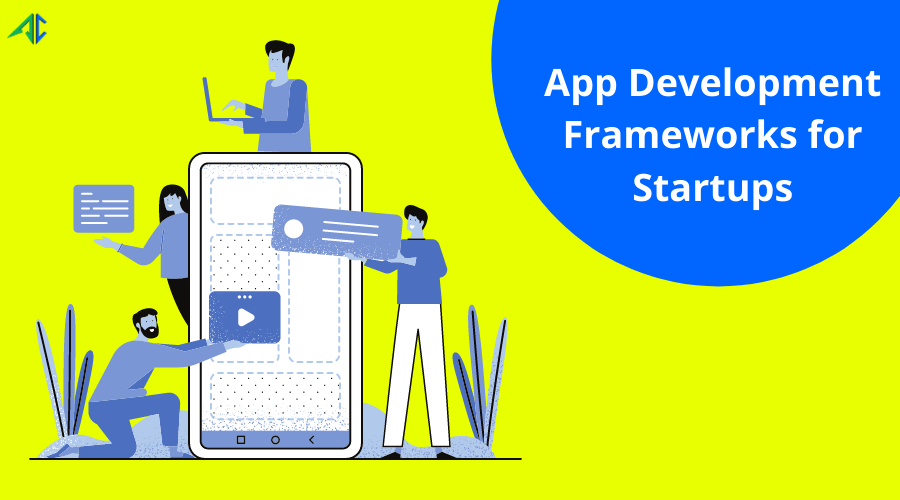Table of Contents
Your choice of app development framework can make or break your startup. No pressure. To help ease the stress of making that decision, this blog will discuss some of the popular mobile app development frameworks so you can make the right decision for your startup!
We’ve all spent countless hours scrolling and tapping through apps on our phones, but have you ever wondered how these apps actually work? What technologies go into their development? Startup app development is no easy feat, and a mobile app development company has to consider myriad factors to make an app successful; choosing the best mobile app development framework is one of them.
What Are App Development Frameworks?
Mobile app development frameworks allow mobile app developers to create an app by using several sub-components and features. The components include debuggers, libraries, and toolsets, among other things. In short, a mobile development framework is a library that is designed to help developers build mobile apps.
These frameworks provide a fundamental structure that supports mobile app development and boosts the app development process, allowing developers to build mobile apps despite limited money and time. However, the question remains: which one is better for startups – native vs hybrid development?
The Top Benefits of Leveraging the Mobile App Development Framework:
- Code Reusability
- Cost-effectiveness
- No Technical Hurdles
- UI/UX Consistency
- Easy to host
- Generalized Cloud Integration
- Faster Time to Market
The Top 7 Mobile App Development Frameworks for Startups
Even if you know everything about startup app development, choosing the right framework can be intimidating. But to help you make the decision, we’ll walk you through the best app development frameworks and the features that will help you build a successful startup app.
React Native
React Native is an open-source framework developed by Facebook in 2015. It is widely known as a cross-platform mobile app development framework that gives native-like capabilities and can run on multiple platforms and devices. In addition to this, the framework builds beautiful and rich apps on JavaScript and ReactJS. Facebook, Instagram, Airbnb, and Bloomberg are some leading apps built on the React Native framework.
Key Features of React Native Framework:
- Code Reusability
- Large Community
- Optimal Performance
- Cost-effective
- Modular Architecture
- Hot Reloading Support
- Simple User Interface
- More Stable Apps
- Third-Party Plugin Support
- Handy Solutions and Libraries
Flutter
Flutter is an elite mobile app development framework developed by Google in 2017, which facilitates developers to create cross-platform startup applications that run smoothly on iOS and Android devices. It has a user-friendly interface, enhanced performance, and top-notch responsiveness.
Flutter uses Dart programming language to build native interfaces, relieving developers of having to write the entire code from scratch to develop a single app for two platforms. Google Ads and Alibaba are some of the better-known apps built with Flutter.
Key Features of Flutter Framework:
- Fast Development
- Widespread OS Compatibility
- Receptive Framework
- Faster Time to Market
- Native-Caliber Performance
- Custom, Animated UI
- Platform-Specific Logic Implementation
- High-end Productivity
- Great Performance
Adobe PhoneGap
Adobe PhoneGap is a popular cross-platform app development architecture for HTML5, Web APIs, JavaScript, and CSS. It is an open-source tool that works on a single code to build lightweight and functional apps. This framework helps mobile app developers create best-in-class performance startup apps supporting the hardware, including storage, camera, GPS, and accelerometer.
Key Features of Adobe PhoneGap Framework:
- Developer-friendly
- Native Functionality
- Robust Back-End
- Easy-to-integrate Plugins
- Great Flexibility
- Multi-Platform Compatibility
Ionic
Ionic is a cross-platform app development framework that works as open-source with programming languages like JavaScript, CSS, and HTML to build native-like mobile apps. Its predefined elements, customizable tools, and extensive features make it one of the most used framework platforms. It works in an optimized manner on the latest mobile devices and provides the best possible environment for apps to hit the market as desired.
Key Features of Ionic Framework:
- Works on a Single Codebase
- Huge and Supportive Community
- Cost-effective Development
- Extensive UI Performance
- Easy Testing
- Utilization of Cordova Plugins
- Widget Development
- Wide Integration and Plugins
Xamarin
Xamarin is one of the most intelligent, reliable, and flexible tools developed by Microsoft. It provides an excellent user interface and comes with almost all essential tools required for a startup app. Developers can use C# for developing iOS and Android apps that work like native apps. This framework enables developers to control the app and give native actions and UI with ease.
Key Features of Xamarin Framework:
- Code Sharing
- Microsoft Technical Support
- .NET and C# Flexibility
- Code Maintenance
- Minimal Time to Market
- Native Integration and Performance
- Easy API Integration
Appcelerator Titanium
Appcelerator Titanium is one of the best hybrid mobile app development frameworks used with a single code for cross-platform development. This JavaScript-based SDK is a mix of both PhoneGap and Xamarin and works as an open-source Titanium that contains 5000 APIs for the development of cross-platform apps. This enables developers to develop a multiplatform app with 90% of the code reused.
Key Features of Appcelerator Titanium Framework:
- Web-oriented
- Rapid Prototyping
- Huge Community
- Offline Support
- Responsive User Interface
Sencha Touch
Sencha Touch is a cross-platform, enterprise-oriented app development platform that uses HTML5 and JavaScript. This framework offers data-intensive design tools with modern web technologies to develop native-like apps. The apps developed on this platform are high-performance, enhance productivity, and facilitate optimization.
Key Features of Sencha Touch Framework:
- Extensive API
- UI Component Libraries
- Native User Interface
- Visual Studio Community
- Shared Codebase
Wrapping Up
This blog lists the top mobile app development frameworks that startups need to be aware of and choose from. Each framework has its own unique features, pros and cons. Compare the frameworks with your startup requirements and choose the one that fits best. Good luck!
We would love to hear your comments relating to the post. Got some other thoughts? Drop us words through our contact page.








